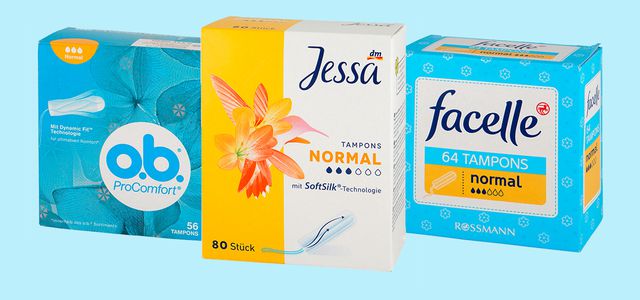
All tampons convinced in the test with their high suction power. Öko-Test has hardly anything to complain about and rated almost all tampons with the top grade “very good”. But a closer look lets us come to another recommendation.
Most women use tampons for menstrual hygiene, writes Öko-Test. They are the first choice for three quarters. Tampons promise to provide reliable protection during the period. Öko-Test has tested 23 different products from brand manufacturers and discounters, including many organic cotton tampons.
In the practical test, the tampons had to prove that they suck up enough blood and are still stable. The experts also checked whether the return thread holds and the tampon can be inserted easily and comfortably.
There was also a pollutant test in the laboratory: critical ingredients are, for example, skin-irritating formaldehyde, superfluous optical brighteners and organic halogen compounds. These substances have repeatedly caused criticism in the past. However, the test result is surprisingly good.
Tampons in the test: 20 winners of the Öko-Test
At Öko-Test, all tampons tested scored “very good” or “good”. In terms of suction power, there was nothing wrong with any tampon. Even with the three “good” tampons, Öko-Test mostly had only minor complaints: for example, one tampon was a little too soft, the other the return thread was not firm enough.
Öko-Test tampons and menstrual cups – All test results as PDF**

(Photo: CC0 Public Domain / Pixabay.de)
Halogen-organic compounds found Öko-Test in a conventional product. These compounds can often trigger allergies. Halogen-organic compounds are in the “U by Camelia tampons”, as the new test has shown. Öko-Test had already criticized this for this product in 2017. The manufacturer has apparently not changed anything.
From the large selection of tampons we recommend the products of eco-manufacturers. They use organic cotton, where many synthetic pesticides are prohibited. This is better for nature and the cotton pickers on the plantations. Recommended tampons made from organic cotton include:
- Natracare, available ** from Memolife, PureNature, Amazon
- Cosmea Bio Tampons (normal)
- Mylily organic tampons (normal), available ** u.a. at Amazon
Organic cotton tampons are better
Organic cotton was not a criterion for Öko-Test in this test series. This means that because of their organic quality, products were not rated better than conventional products. We consider eco-tampons to be more recommended. They are made from organic cotton, which is significantly more sustainable than conventional cotton. In addition, organic cotton tampons are free of pesticides and genetic engineering. This is not a matter of course, because conventional tampons can contain pesticide residues (BfR).
Tampons are disposable
Tampons consume a lot of resources and cause large amounts of waste. But are menstrual cups or sanitary napkins better? So far there are hardly any studies on the ecological balance of tampons. The trade magazine Resources, Conservation and Recycling comes to the conclusion in a study in 2019 that menstrual cups are significantly more sustainable than tampons and sanitary napkins. However, the authors of the study only consider washing the menstrual cup and not boiling it, which requires more energy and water. A clear answer can therefore not be found. If you want to avoid a lot of garbage, it is better to use a menstrual cup. With good care, they last for several years.
You can find all the details in the 04/2020 issue of Öko-Test and online at www.ökotest.de.
Öko-Test tampons and menstrual cups – All test results as PDF**
Read more on Techzle.com:
- Leaderboard: organic tampons, washable pads, menstrual cups & sponges
- Menstrual problems: These home remedies help
- Period underwear: how recommendable are period panties?